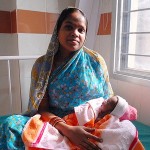Written by Lin Lee, Senior Editor at BioMed Central
D eaths of women and children in low and middle income countries account for over 95% of all maternal and child deaths. This startling figure comes as we approach the deadline to the 2015 Millennium Development Goals (MDGs). These eight goals aim to release people from poverty and associated health inequities. Although some goals will be met, it seems that MDGs 4 and 5 which relate to child survival and maternal health respectively, will not.
eaths of women and children in low and middle income countries account for over 95% of all maternal and child deaths. This startling figure comes as we approach the deadline to the 2015 Millennium Development Goals (MDGs). These eight goals aim to release people from poverty and associated health inequities. Although some goals will be met, it seems that MDGs 4 and 5 which relate to child survival and maternal health respectively, will not.
Childbirth, for instance, has one of the highest mortality rates for both the mother and the new born – complications  during labor and delivery account for half the maternal deaths, one third of stillbirths and a quarter of neonatal deaths occurring each year worldwide. Those who give birth without skilled attendants, such as those in resource-limited settings, are at higher risk of poor outcomes. Robert L Goldenberg and colleagues recently conducted a cluster randomized trial set in one middle-income and five low-income countries that combined a community- and facility-based approach to improve pregnancy outcomes. They found that interventions based on birth planning, hospital transport and staff training do not reduce perinatal mortality in these settings. It was thought that this negative result may have been due to requiring substantially more obstetric and neonatal care infrastructure than was available at the sites during this trial.
during labor and delivery account for half the maternal deaths, one third of stillbirths and a quarter of neonatal deaths occurring each year worldwide. Those who give birth without skilled attendants, such as those in resource-limited settings, are at higher risk of poor outcomes. Robert L Goldenberg and colleagues recently conducted a cluster randomized trial set in one middle-income and five low-income countries that combined a community- and facility-based approach to improve pregnancy outcomes. They found that interventions based on birth planning, hospital transport and staff training do not reduce perinatal mortality in these settings. It was thought that this negative result may have been due to requiring substantially more obstetric and neonatal care infrastructure than was available at the sites during this trial.
The need for access to appropriate health facilities in addition to community care is an issue that was recently highlighted in a commentary written by Jennifer Bryce, Robert Black and Cesar Victora. These authors review the progress of MDGs 4 and 5, highlighting that, although there are known and effective interventions to address the majority of the causes of deaths, current levels of intervention coverage and infrastructure are too low to effectively manage this. Coverage should be both sustained and equitable, yet few governments in low-income countries have been able to achieve this, reasons for which vary by setting and are not fully understood.
Bryce and colleagues also emphasize the importance of maternal and child health for global health as a whole; under-five mortality is one of the major global determinants of life expectancy, and women and child health represent distal determinants such as inequalities in economic resources and education.
 Halting the spread of HIV/AIDS is another MDG. In a research article, Sally Blower and colleagues explore the drivers and patterns of HIV in Lesotho where it is hyperendemic, finding that reducing the number of sex partners might not be very effective in curbing transmission. This is in contrast to findings from other sub-Saharan African countries, highlighting the importance of country-specific research that can influence subsequent policy changes.
Halting the spread of HIV/AIDS is another MDG. In a research article, Sally Blower and colleagues explore the drivers and patterns of HIV in Lesotho where it is hyperendemic, finding that reducing the number of sex partners might not be very effective in curbing transmission. This is in contrast to findings from other sub-Saharan African countries, highlighting the importance of country-specific research that can influence subsequent policy changes.
These research articles represent great examples of evidence-based medicine upon which to base interventions and policy. However, in resource-limited settings, it can sometimes be a challenge to both treat individuals, as well as to conduct high quality research. The caveat is that research is, of course, essential to understand how to improve health outcomes, both in terms of informing policies and designing interventions. In a forum article, global health researchers based in Canada, India, China, South Africa, Mexico, Rwanda and the U.S.A, discuss their personal experiences of evidence-based medicine in resource-limited settings in terms of progress and challenges. They touch upon issues such as universal healthcare, research productivity and transparency in data dissemination. Access to relevant data is essential when making informed decisions about global health issues. As an Open Access journal, BMC Medicine advocates that research should be freely available to inform evidence based medicine and further research.
All the articles described above are included in our article collection, Medicine for Global Health.
Comments